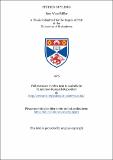Studies of ylides
Abstract
The preparation and attempted preparation of diaminomethylene-sulphuranes (thiouronium ylides) by various routes is described. The principal route chosen was by proton abstraction from the conjugate acid (thiouronium salt) using a suitable non-hydroxylic base, usually phenyl lithium or triethylamine. In the range of compounds examined where the carbanionic substituents contained electron withdrawing groups such as carbonyl, sulphonyl, nitrile and nitro groups, considerable difficulty was encountered in the preparation of the precursor salts. Of the few salts in this category that were obtainable, only one (disulphonyl substituted) gave rise to a stable ylide. On the other hand, many salts containing the cyclopentadiene ring gave rise to ylides. Some of these, notably the fluorenylides, could be isolated and characterised, while the properties of others could only be observed in solution and they decomposed or rearranged on attempted isolation. A second preparative route was briefly investigated, namely the thermal decomposition of 9-diazofluorene in the presence of arylthioureas, but in several cases this led to unexpected products. Comparative studies of the reactivities of the fluorenylides towards carbonyl compounds and hydrolysis have been made, and some other reactions of these ylides are also described. The 2,3,4-triphenylcyclopentadienylides have been found to undergo novel cyclisation reactions with aldehydes and nitrosobenzene. A product from the former reaction was dehydrogenated to give a stable heterocycle with a 14Π electron periphery. An attempt to prepare a selenium analogue of one of the thiouronium fluorenylides is described. The attempted preparation of guanidinium fluorenylides by various methods is described, principally the 'salt' and 'diazo' methods. The former method was more suitable for alkyl substituted guanidines, whereas the latter method was of benefit with aryl substituents. Proton abstraction from ono of the alkylguanidinium salts gave rise to a product which showed some evidence for ylide character. On the other hand, the aryl substituted products appeared to show no ylide-like properties, A further point of interest arose in the diazo reaction, whore the fluorene nucleus was shown to have substituted on the more sterically hindered position, which was verified later by synthesis.
Type
Thesis, PhD Doctor of Philosophy
Collections
Items in the St Andrews Research Repository are protected by copyright, with all rights reserved, unless otherwise indicated.

